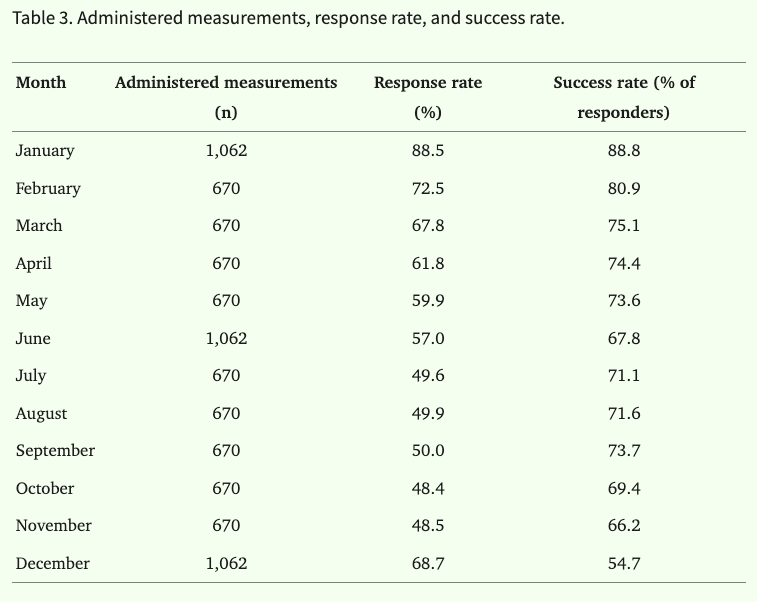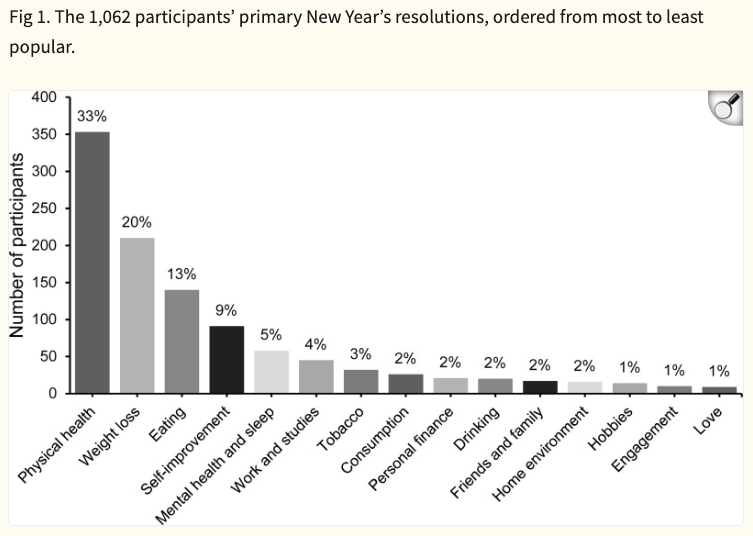What exactly is wrong with New Year's resolutions? They are famously unsuccessful, but they remain enormously popular; we are resolute about our resolutions. They have existed for centuries. They conform to the economic maxim (or perhaps just the logical one), that no goal is achieved without being set. And yet they don't work.
Should we dump them? Should we keep them? In some ways, it’s ironic that New Year's resolutions happen so close to Christmas - they are like an adult version of writing a letter to Santa. You know you probably won’t get what you ask for, but it’s nice to dream.
Perhaps because they are so trivial, there is surprisingly little academic research on New Year's resolutions. We know this because at least one piece of academic research notes how little other research has been done!
This large-ish study was led by the Department of Psychology of the University of Sweden in 2020, which asked about a thousand participants what their New Year's resolution was and then returned a year later to find out whether they had kept it. The answer was that around half of the participants felt their goal had been achieved.
Actually, this seems pretty high as the research notes, explaining that the sample was probably skewed by the fact that a self-signup process was used for recruitment. It’s reasonable to assume that participants were, therefore more motivated, on average, than those in previous studies. And even then only 55% considered they had succeeded.

The study had two additional interesting aspects. The kinds of resolutions participants were setting were dead normal: physical health, losing weight and eating less. But the two additional goals of the study were first, to examine whether getting coaching on how to set goals made a difference and second, to study whether approach-oriented goals were significantly more successful than avoidance-oriented goals.
To answer the coaching question, the group was split into three. One group got no coaching, the second group got some, and the third got a lot. It helped to get advice, as you might expect, but not hugely. The difference in the success rate was about 6.3%. Presumably, most people instinctively know the basics of setting goals, the first and most important of which is to be realistic.

But the real oddity was that the group who got some support performed significantly better than those who got a lot of support. Participants in the group who got the most coaching were encouraged to formulate effective goals. This is one of those findings which tells you more about the people setting the study than those participating in it because I would guess everybody knows the one rule for New Year's resolutions is that you don’t write them down or, worse, post them on the internet since that is a road that goes straight to hell.
The idealistic notion of the people trying to help and coach participants defined an effective goal as specific and time-framed. Excuse me. Allow me to offer some ad hoc advice: don't do that! Choose a goal which is distinctly fudgy. "I will lose 10kg by June 1, 2025" is not a goal; it's an invitation to failure.
The only time I have ever kept to a specific time and specific resolution was the year I solemnly undertook to resume smoking precisely at midnight. That seemed to work like a bomb and successfully drew the curtain on a year-long effort to give up smoking.
As for the difference between approach-oriented goals and avoidance-oriented goals, I find both interesting and gratifying. The difference is essentially between developing a new positive habit or quitting a bad habit. The study observed a 58.9% success rate in approach goals compared to a 47.1% success rate in avoidance goals.
This is consistent with previous studies and does make sense. Everything about avoidance goals is negative and self-recriminatory. Presumably, the very fact you have chosen this goal in the first place was because it is difficult to achieve and you need the 'new year/new you' motivation just to face that hurdle, let alone clear it.
Everything about an approach goal is exactly the opposite: it's all fuzzy and warm. For example, learning a new language is essentially a resolution to register a positive achievement rather than a negative one. Succeed and you are a better person, not merely a less bad person.
An artist friend of mine - artists always have the best ideas - suggests the problem with New Year’s resolutions is simply the overweening and conceited goal orientation. In some senses, New Year's resolutions, when they are set in stone as specific goals, are as censorious as a teacher holding a cane.
Would it not be better, he suggests, to have a concept that rides with you - not an explicit goal necessarily, but a reference point or guide to channel you? He chooses words that serve as a standard for evaluation or comparison. Examples would be clarity, or openness, or wellness.
In this sense, you are not making a specific promise to achieve something particular but instead improving your mental being - something which could well have an even more significant upside. And because it's the striving rather than a result you seek the whole notion of success or, more likely, failure is no longer part of the equation. Great idea.
There are other strategies for success, with perhaps the most important being to find a balance between keeping your eye on the prize and practising what is euphemistically called self-compassion. Personally, I practice a lot of that on the way to the fridge to have another nibble.
When you think about it, there is a lot of economics in New Year's resolutions. There is present bias (the tendency to overvalue immediate rewards over long-term benefits); the danger of sunk costs (irrationally persisting in goals because of prior investments, even when doing so is no longer optimal); and, of course, there is hyperbolic discounting (the tendency to prefer smaller, immediate rewards over larger, delayed rewards).
But most of all, there is incentive theory: the best way to keep a New Year's resolution is to attach an incentive to it as you would if you were a parent trying to get your children to clean their rooms. Of course, the person setting the incentive is you and providing your own incentive is somewhat of a contradiction in terms.
Perhaps it's time for the government to step in and grant tax relief to people who keep their resolutions. Or perhaps not.
From the department of tfound on the internet

From the department of the extremely hopeful

From the departmet of useful pet husbandry tips


Thank you for reading this post - by all means tell me what your New Years' resolutions are in the comments. Please do forward this post to a friend if you think they might be interested. Sign up in the bloc above, its free for now. Catch you in a few days.
💥 💥 💥



Join the conversation